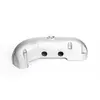Mobile:+86-311-808-126-83
Email:info@ydcastings.com
75mm End Cap for Secure Sealing and Versatile Applications in Plumbing and Construction
The Versatility and Importance of 75mm End Caps
In various engineering and manufacturing sectors, the incorporation of end caps is a common practice to ensure the durability and functionality of products. Among these, the 75mm end cap stands out for its versatility and application across different industries. This article explores the significance of 75mm end caps, covering their design, applications, materials, and benefits.
Design and Specifications
The 75mm end cap is primarily defined by its diameter, which measures 75 millimeters. This standard size fits a wide range of pipes and fittings, making it a popular choice for many applications. These end caps are typically constructed to provide a snug fit at the end of a pipe or tube, preventing the entry of debris, fluids, and gases. Commonly, these caps are designed with a variety of features, such as threading, grooves, or flanges, to ensure secure attachment and compatibility with different piping systems.
Applications Across Industries
The applications of 75mm end caps are vast. In plumbing, they serve as perfect solutions for sealing both water and waste pipes, allowing for a clean and efficient closure that minimizes leaks. In the HVAC (Heating, Ventilation, and Air Conditioning) sector, these end caps contribute to maintaining the integrity of ductwork, ensuring that air flows freely without any unwanted contaminants entering the system.
Moreover, 75mm end caps are widely used in construction and civil engineering projects. They are often employed in structural applications where strength and durability are paramount, such as in the reinforcement of columns, beams, and other load-bearing components. In addition to structural applications, 75mm end caps find usage in the production of furniture and decorative items, adding aesthetic value while ensuring functionality.
75mm end cap

Material Options
To cater to the wide array of applications, 75mm end caps are made from various materials. Common options include plastic, metal, and rubber. Plastic end caps, such as those made from PVC or polyethylene, are lightweight and resistant to corrosion, making them ideal for plumbing and outdoor applications. Conversely, metal end caps, often constructed from stainless steel or aluminum, provide enhanced durability and are suitable for high-pressure contexts. Rubber end caps, on the other hand, are flexible and resilient, making them perfect for applications that require a tight seal without compromising structural integrity.
Benefits of Using 75mm End Caps
The advantages of using 75mm end caps are manifold. First and foremost, they provide a reliable solution for terminating pipe systems, preventing leaks and contamination. By doing so, they enhance the overall longevity of the piping systems, reducing maintenance costs over time. Additionally, the secure sealing capability of these end caps contributes to improved safety in various applications, especially in gas and chemical transport.
Another notable benefit of 75mm end caps is their ease of installation. Most caps are designed for straightforward application, requiring minimal tools and expertise, thereby saving time and labor costs during installation.
Conclusion
In conclusion, the 75mm end cap is a crucial component across numerous industries. From plumbing to construction, its ability to provide secure seals, enhance durability, and accommodate various materials makes it an invaluable asset. As industries continue to evolve, the demand for reliable and versatile components like 75mm end caps is likely to grow, ensuring their place in the future of manufacturing and construction. Whether for practical applications or innovative designs, the significance of these end caps cannot be overstated.
-
Why Should You Invest in Superior Pump Castings for Your Equipment?NewsJun.09,2025
-
Unlock Performance Potential with Stainless Impellers and Aluminum End CapsNewsJun.09,2025
-
Revolutionize Your Machinery with Superior Cast Iron and Aluminum ComponentsNewsJun.09,2025
-
Revolutionize Fluid Dynamics with Premium Pump ComponentsNewsJun.09,2025
-
Optimizing Industrial Systems with Essential Valve ComponentsNewsJun.09,2025
-
Elevate Grid Efficiency with High-Precision Power CastingsNewsJun.09,2025











